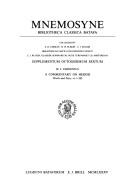| Listing 1 - 2 of 2 |
Sort by
|
Book
ISBN: 3110457032 3110457369 3110453053 Year: 2016 Publisher: Berlin, [Germany] ; Boston, [Massachusetts] : De Gruyter,
Abstract | Keywords | Export | Availability | Bookmark
 Loading...
Loading...Choose an application
- Reference Manager
- EndNote
- RefWorks (Direct export to RefWorks)
Im frühgriechischen Denken nimmt die Idee der Abhängigkeit menschlichen Lebens von ihn übersteigenden Mächten eine zentrale Stellung ein; der Mensch wird als weitgehend passiv verstanden. Anders Hesiod: Hinter seinen Erga steht das Bild eines aktiven, gestaltenden Menschen, der die Möglichkeit besitzt, sich für ein bestimmtes Handeln - gut wie schlecht - zu entscheiden. Die Entscheidung trifft sein nous (Verstand), der "das eigentliche Selbst des Menschen" (Arbogast Schmitt) darstellt. Soll Handeln erfolgreich sein, muss es sich innerhalb der auf klaren Regeln beruhenden dike-Ordnung (Recht, Gerechtigkeit) bewegen; so kann der Mensch seine Zukunft weitgehend selbst gestalten und seine Ziele (ökonomisch, sozial) verwirklichen. Weil er erkennen kann, was schlecht ist, existiert auch kein scheinbar irrational waltendes Schicksal: Er ist nicht mehr nur Verantwortlicher (wie im homerischen Epos), er ist schuldig (aitios) an dem durch ihn in Gang gesetzten Geschehen. Vorliegende Untersuchung geht nicht nur dieser neuartigen Sichtweise nach, sondern zeigt auch, dass dem nous die Schlüsselfunktion für die adäquate Rezeption der Erga zukommt, die als Vereinigung unterschiedlicher Gattungen Hesiods bereits in der Theogonie erhobenen Anspruch, neuartige Dichtung zu schaffen, einlöst.
Didactic poetry, Classical --- Fate and fatalism in literature. --- Mind and body in literature. --- Epos. --- Farmer's almanac. --- Frühgriechische Literatur. --- Hesiod. --- Lehrdichtung. --- anthropology. --- destiny. --- nous. --- poetics. --- responsibility. --- Schicksal --- Verstand --- LITERARY CRITICISM / Ancient & Classical. --- Motiv --- Classical didactic poetry --- Classical poetry --- History and criticism. --- Works and days (Hesiod) --- Erga kai hēmerai (Hesiod)

ISBN: 9004074651 9004328211 0585302502 9789004074651 Year: 1985 Volume: 86 Publisher: Leiden Brill
Abstract | Keywords | Export | Availability | Bookmark
 Loading...
Loading...Choose an application
- Reference Manager
- EndNote
- RefWorks (Direct export to RefWorks)
This is a word-for-word commentary on the first part (vv. 1-382) of Hesiod's Works and Days . Special attention has been paid to peculiarities of grammar and idiom, but also to figures of style and the poet's train of thought. All interpretations - many of them which are new - are documented as fully, but at the same time as concisely, as possible. This documentation, which will prove useful for the interpretation of many other texts, has been made more easily accesible by detailed indexes. Discussion of other views plays a considerable part in the commentary and will help the reader avoid a great number of minor and major misunderstandings. The commentary has been confined to the first part of the poem because this seemed to be more in need of a thorough explanation than the rest. It is also the most interesting part in so far as it forms a kind of manual of social morality. The basis concepts of this doctrine are carefully defined in the commentary, and their historical implications are briefly indicated.
Hesiodus --- Greek poetry --- Poésie grecque --- History and criticism --- Histoire et critique --- Hesiod --- Didactic poetry, Greek --- Agriculture in literature --- Greece --- In literature --- -Greek didactic poetry --- Hesiodus. --- Gesiod --- Geziod --- Esiodo --- Hēsiodos --- Hezjod --- Hésiode --- Hesíodo --- Hesiyodos --- הסיודוס --- Ἡσίοδος --- Seasons in literature --- In literature. --- -History and criticism --- Hesiodos --- Poésie grecque --- Seasons in poetry --- Hesiod. --- Criticism and interpretation --- Agriculture in literature. --- Didactic poetry, Greek. --- Literature. --- Seasons in literature. --- Belles-lettres --- Western literature (Western countries) --- World literature --- Philology --- Authors --- Authorship --- Greek didactic poetry --- History and criticism. --- Works and days (Hesiod) --- Erga kai hēmerai (Hesiod) --- Greece. --- al-Yūnān --- Ancient Greece --- Ellada --- Ellas --- Ellēnikē Dēmokratia --- Elliniki Dimokratia --- Grčija --- Grèce --- Grecia --- Gret͡sii͡ --- Griechenland --- Hellada --- Hellas --- Hellenic Republic --- Hellēnikē Dēmokratia --- Kingdom of Greece --- République hellénique --- Royaume de Grèce --- Vasileion tēs Hellados --- Xila --- Yaṿan --- Yūnān --- Didactic poetry, Greek - History and criticism --- Hesiod - Works and days --- Greece - In literature
| Listing 1 - 2 of 2 |
Sort by
|

 Search
Search Feedback
Feedback About UniCat
About UniCat  Help
Help News
News